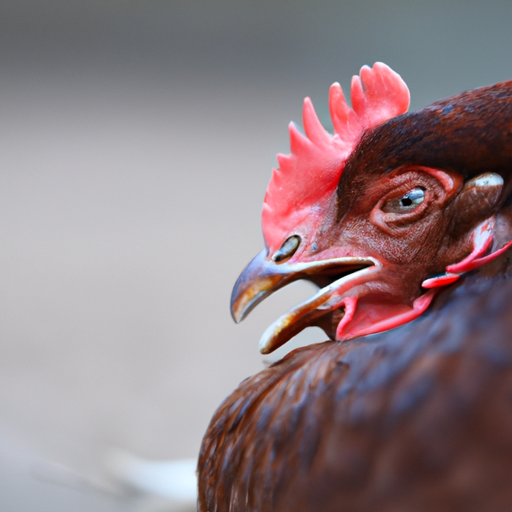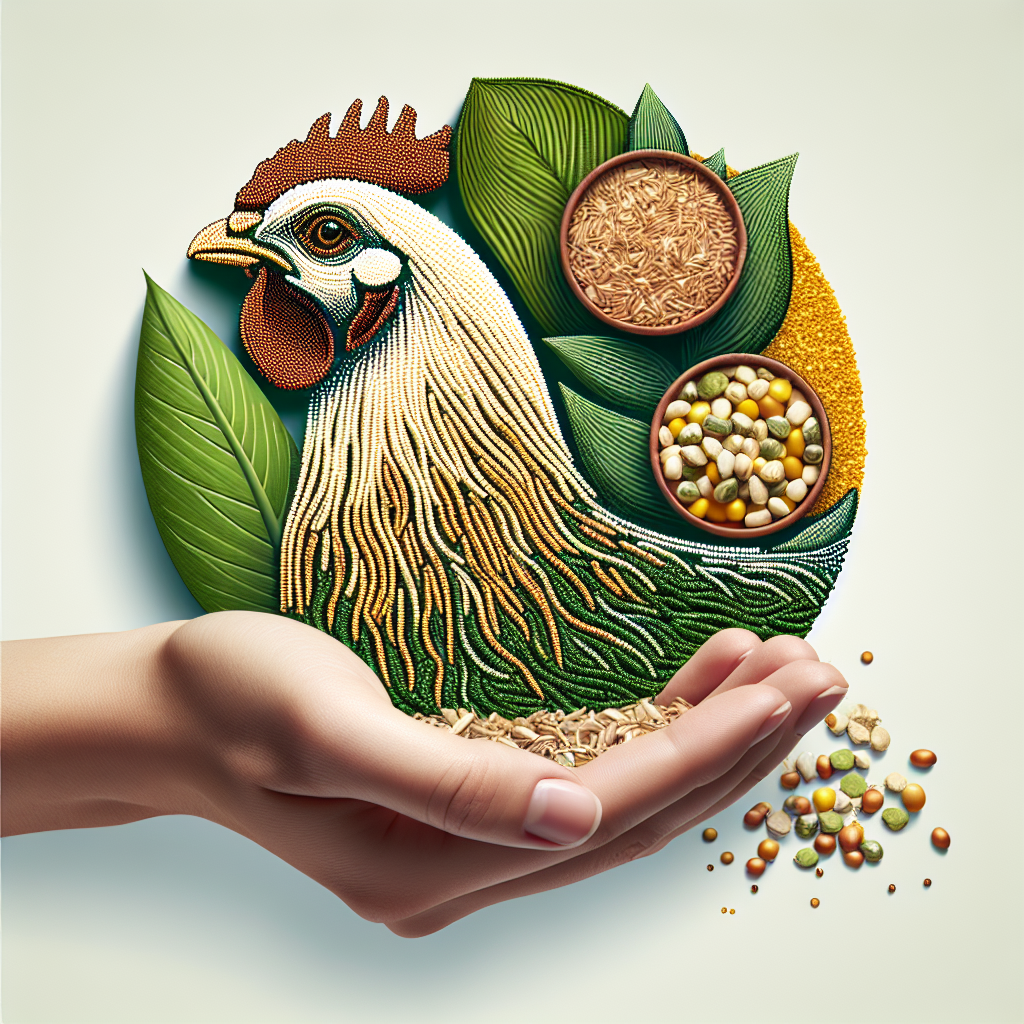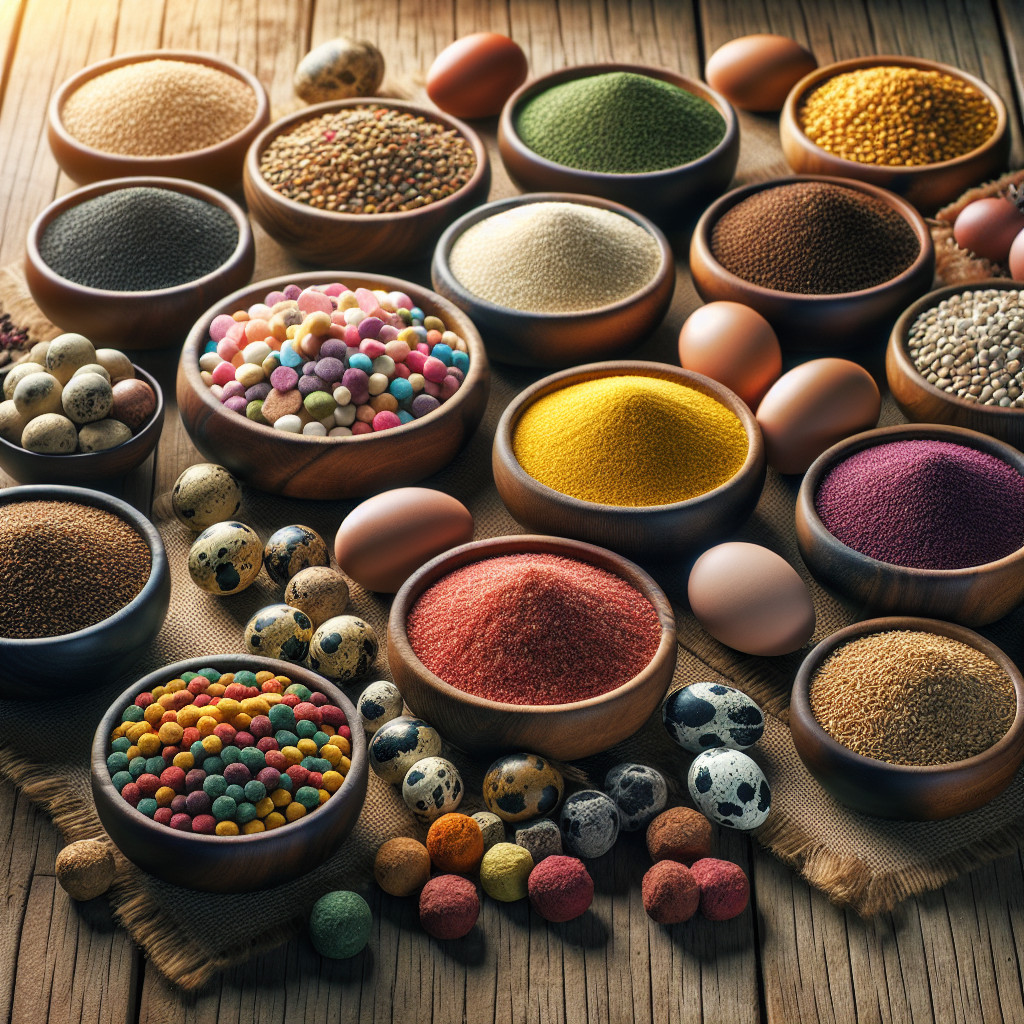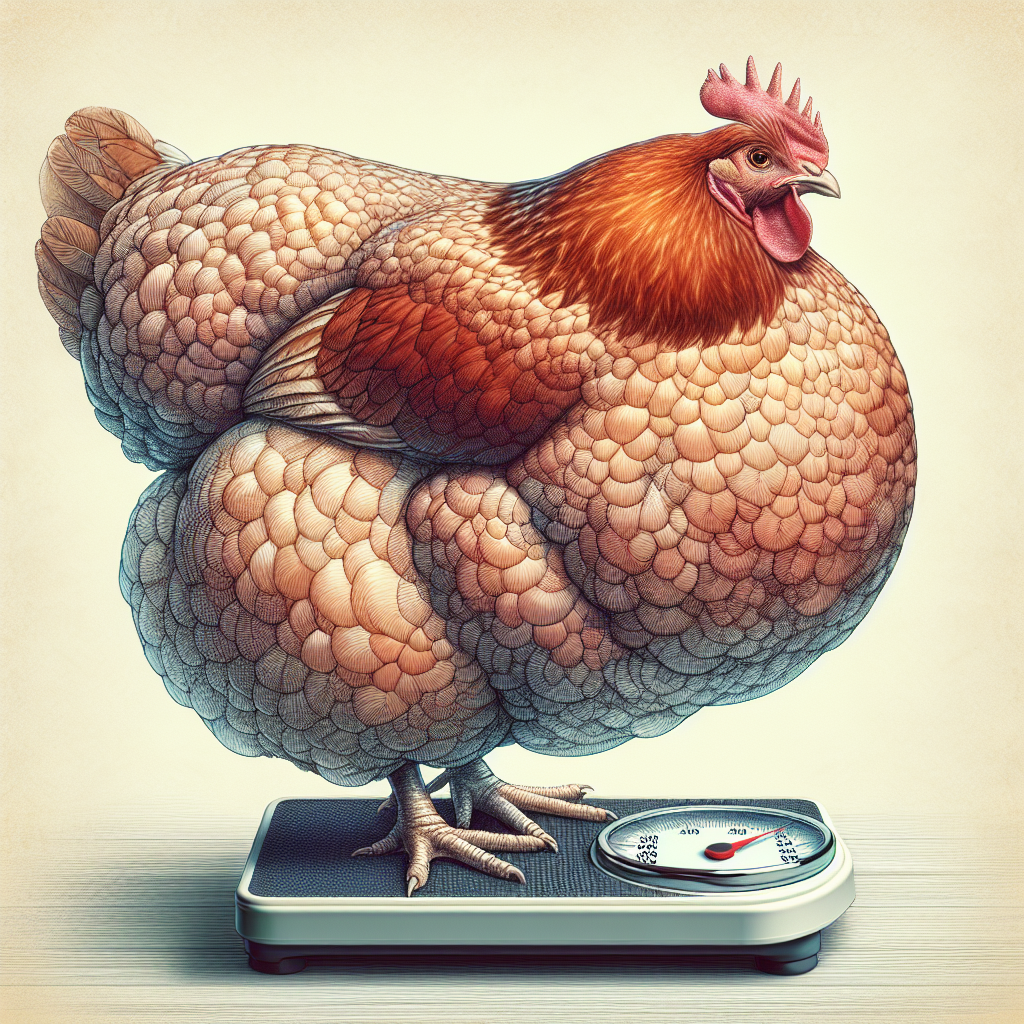In order to ensure healthy growth and development in chickens, it is crucial to provide them with the essential nutrients they need. These nutrients play a vital role in supporting their overall health, providing energy, promoting strong bones and feathers, and maintaining proper organ function. From proteins to carbohydrates, vitamins to minerals, each nutrient plays a unique role in ensuring the robust growth of chickens. By understanding and meeting their nutritional needs, you can ensure that your flock thrives and flourishes.
Protein
Why protein is important for chicken growth
Protein is a vital nutrient for chicken growth and development. It plays a crucial role in supporting muscle development, bone growth, and the synthesis of enzymes and hormones. Protein provides the building blocks needed for the formation of tissues and organs, and it is essential for the production of eggs in laying hens. Protein deficiency can lead to stunted growth, reduced egg production, and weakened immune systems in chickens. Therefore, ensuring an adequate supply of protein is crucial for the overall health and well-being of your chickens.
Food sources of protein for chickens
Chickens can obtain protein from both animal and plant-based sources. Some common animal-derived protein sources for chickens include fish meal, meat and bone meal, and insect proteins. Plant-based protein sources include soybean meal, corn gluten meal, and sunflower meal. These ingredients are often included in commercially available chicken feeds. Additionally, chickens can also consume protein-rich foods such as insects, worms, and kitchen scraps, which can supplement their dietary protein intake.
Recommended protein content for chicken feed
The recommended protein content in chicken feed varies depending on the life stage and purpose of the chickens. For growing chickens, a protein content of around 20-22% is generally recommended to support their rapid growth. Laying hens, on the other hand, require a slightly lower protein content of about 16-18% in their diet. It is important to ensure the protein content in the feed matches the nutritional requirements of the specific age and purpose of the chickens to promote healthy growth and optimal production.
Carbohydrates
Role of carbohydrates in chicken growth
Carbohydrates serve as a vital source of energy for chickens. They are broken down into glucose, which provides fuel for various physiological processes such as movement, digestion, and heat production. Carbohydrates also aid in the proper functioning of the nervous system, the growth of feathers, and the maintenance of overall body temperature. In addition to energy production, carbohydrates play a crucial role in supporting the growth and development of chickens.
Types of carbohydrates needed for chickens
Chickens require both simple and complex carbohydrates in their diet. Simple carbohydrates, such as sugars, are quickly absorbed and provide a quick source of energy. Complex carbohydrates, such as grains and fiber-rich foods, provide sustained energy and aid in digestion. Common sources of carbohydrates in chicken feed include corn, wheat, barley, and oats. These ingredients provide a balance of simple and complex carbohydrates to meet the energy requirements of chickens.
Recommended carbohydrate content for chicken feed
The recommended carbohydrate content in chicken feed typically ranges from 40-60%. This ensures an adequate energy supply for the chickens’ daily activities and growth. It is important to consider the type and quality of carbohydrates used in the feed, as well as the specific dietary requirements of the chickens. Providing a balanced and varied diet that includes a mix of grains, seeds, and other carbohydrate-rich ingredients can help support optimal chicken growth and health.
Fats
Importance of fats in chicken growth
Fats, also known as lipids, are essential for chicken growth and development. They are a concentrated source of energy and provide more than double the amount of energy per gram compared to proteins and carbohydrates. Fats play a crucial role in the absorption of fat-soluble vitamins, the development of healthy feathers, and the production of hormones. They also help regulate body temperature and protect vital organs. Including fats in the diet of chickens is vital to support their growth and overall health.
Sources of healthy fats for chickens
There are various sources of healthy fats that can be included in the diet of chickens. Common sources of fats in chicken feed include vegetable oils, such as soybean oil or corn oil, and animal fats, such as tallow or lard. These fats provide essential fatty acids, including omega-3 and omega-6 fatty acids, which are beneficial for the chickens’ overall health. It is important to choose high-quality fats that are free from rancidity and ensure they are included in appropriate quantities to meet the nutritional needs of the chickens.
Recommended fat content for chicken feed
The recommended fat content in chicken feed typically ranges from 3-8%. This ensures an adequate supply of energy and essential fatty acids without exceeding the chickens’ dietary requirements. Excessive fat intake can lead to weight gain and health issues in chickens, so it is important to provide a balanced diet that includes an appropriate amount of fats. Consulting with a poultry nutritionist or referring to established guidelines can help determine the optimum fat content for your chickens’ feed.
Vitamins
Key vitamins for chicken growth
Vitamins are essential for the overall growth and development of chickens. They play a crucial role in metabolic processes, immune function, and proper functioning of various organs and systems. Some key vitamins required for chicken growth include vitamin A, vitamin D, vitamin E, vitamin K, and the B-complex vitamins. These vitamins contribute to bone development, feather growth, reproductive health, and overall vitality in chickens.
Food sources of vitamins for chickens
Chickens can obtain vitamins from both natural food sources and fortified feeds. Vitamin A can be found in green leafy vegetables, carrots, and liver. Vitamin D is synthesized through exposure to sunlight, but additional sources include fish oils and fortified feeds. Good sources of vitamin E include wheat germ, sunflower seeds, and nuts. Leafy greens, legumes, and certain animal by-products are rich in vitamin K. B-complex vitamins can be found in grains, legumes, and yeast. Providing a balanced diet that incorporates these natural sources and fortified feeds is essential to meet the vitamin requirements of chickens.
Recommended vitamin supplements for chickens
Vitamin supplementation may be necessary to ensure that chickens receive adequate levels of essential vitamins. Commercially available vitamin supplements can be added to the feed or provided separately. It is important to follow the recommended dosage and consult with a poultry nutritionist or veterinarian to determine the specific needs of your chickens. Regular observation and monitoring of the chickens’ health can help identify any deficiencies or imbalances that may require additional supplementation.
Minerals
Essential minerals for chicken growth
Minerals are essential for various physiological functions in chickens, including bone formation, enzyme activation, and nerve transmission. Some essential minerals required for chicken growth include calcium, phosphorus, potassium, magnesium, sodium, and iron. These minerals contribute to skeletal development, muscle function, electrolyte balance, and blood cell formation in chickens.
Mineral-rich foods for chickens
Chickens can obtain minerals from a variety of natural food sources. Calcium-rich foods include oyster shells, limestone, and bone meal. Phosphorus can be found in meat and bone meal, fish meal, and legumes. Potassium is abundant in leafy greens, bananas, and carrots. Magnesium can be obtained from green vegetables, nuts, and seeds. Sodium is present in salt and can be provided ad libitum. Iron is found in meat, blood meal, and fortified feeds. Providing a balanced and varied diet that incorporates these mineral-rich foods is important for chickens’ healthy growth.
Recommended mineral supplements for chickens
Supplementation of minerals may be necessary to ensure adequate levels of essential minerals in the diet of chickens. Free-choice mineral supplements, such as calcium or mineral blocks, can be provided to chickens to allow them to self-regulate their intake based on their individual needs. Additionally, mineral supplements can be included in the feed formulation to ensure the chickens receive the required amounts of minerals. Consulting with a poultry nutritionist or veterinarian can help determine the appropriate mineral supplementation strategy based on the specific needs of your chickens.
Water
The significance of water in chicken growth
Water is a vital component of a chicken’s diet and plays a crucial role in their growth and overall well-being. It is involved in almost every physiological process, including digestion, nutrient absorption, waste elimination, and temperature regulation. Water is also essential for maintaining proper hydration, promoting healthy feather growth, and supporting optimal organ function in chickens.
Water requirements for chickens
Chickens have specific water requirements that vary depending on factors such as age, environmental conditions, and production stage. As a general guideline, chickens require approximately two to three times the amount of water compared to their feed intake. On average, a laying hen consumes around 200-250 mL of water per day, while a meat bird requires 1-2 liters of water per day. It is important to provide clean and fresh water at all times, ensuring an adequate supply for the chickens’ hydration needs.
Importance of clean and fresh water for chickens
Clean and fresh water is crucial for chickens‘ overall health and growth. Contaminated or dirty water can lead to various health issues, including bacterial infections, dehydration, impaired egg production, and reduced growth rates. Regularly cleaning and disinfecting water containers, providing access to clean water sources, and regularly monitoring water quality are essential practices to ensure the chickens have access to clean and safe hydration.
Calcium
Role of calcium in chicken development
Calcium is a critical mineral for chicken development, particularly for the growth and maintenance of strong bones and eggshell formation in laying hens. It is an essential component of the skeletal system and is necessary for muscle function, nerve transmission, and blood clotting. Adequate calcium intake is crucial for chickens to support their growth, maintain skeletal integrity, and ensure the production of high-quality eggs.
Calcium sources for chickens
Chickens can obtain calcium from both natural food sources and supplements. Natural sources of calcium include oyster shells, limestone, eggshells, and bone meal. These can be offered separately or as a calcium supplement in the feed. It is important to provide a constant source of calcium, especially for laying hens, to support the development of strong eggshells and prevent calcium deficiencies.
Calcium requirements and supplementation for chickens
The level of calcium required in the diet of chickens depends on their life stage and purpose. Laying hens have higher calcium requirements to support eggshell formation, while growing chickens require calcium for skeletal development. The recommended calcium content in chicken feed for laying hens is typically around 3.5-4.0%. Providing access to crushed oyster shells or limestone as a free-choice supplement can also help ensure laying hens obtain the additional calcium they need. Consulting with a poultry nutritionist can help determine the optimal calcium supplementation strategy for your chickens’ specific requirements.
Phosphorus
Importance of phosphorus in chicken growth
Phosphorus is an essential mineral for chicken growth and development. It plays a key role in skeletal development, energy metabolism, and nutrient utilization in chickens. Phosphorus is required for the formation of strong bones, teeth, and feathers. It is also involved in various physiological processes, including DNA synthesis, enzyme activation, and the regulation of acid-base balance.
Phosphorus-rich feeds for chickens
Chickens can obtain phosphorus from various feed ingredients. Meat and bone meal, fish meal, and legumes are excellent sources of phosphorus for chickens. These ingredients can be included in the feed formulation to ensure an adequate supply of phosphorus. Additionally, providing access to free-choice mineral supplements containing phosphorus can help ensure chickens meet their dietary phosphorus requirements.
Recommended phosphorus content for chicken feed
The recommended phosphorus content in chicken feed typically ranges from 0.35-0.45%. This ensures an appropriate balance of phosphorus in relation to the calcium content, as an imbalance can interfere with mineral absorption and lead to skeletal issues or reduced egg quality. Balancing the calcium-to-phosphorus ratio in the diet is crucial to support optimal growth and overall health in chickens. Consultation with a poultry nutritionist or veterinarian can help determine the ideal phosphorus content for your chickens’ feed.
Trace Minerals
Essential trace minerals for chicken growth
Trace minerals are essential for various physiological functions in chickens. Some essential trace minerals required for chicken growth include copper, zinc, manganese, selenium, and iodine. These minerals are essential co-factors for numerous enzymes and play a crucial role in the production of energy, immune function, and overall growth and development in chickens.
Trace mineral sources for chickens
Chickens can obtain trace minerals from a variety of feed ingredients. Copper can be found in liver, seafood, and some grains. Good sources of zinc include meat, seafood, and legumes. Manganese-rich foods include leafy greens, fruits, and nuts. Selenium can be obtained from fish, meat, and some grains. Iodine is present in seafood, seaweed, and iodized salt. Offering a balanced diet that incorporates these trace mineral sources is important to meet the specific needs of chickens.
Supplementation of trace minerals for chickens
Supplementation of trace minerals may be necessary to meet the specific requirements of chickens. Trace mineral supplements can be added to the feed formulation to ensure an adequate supply of essential trace minerals. It is essential to consult with a poultry nutritionist to determine the appropriate dosage and supplementation strategy based on the specific needs of your chickens. Regular monitoring of the chickens’ health and observation of any signs of deficiency can aid in adjusting the trace mineral supplementation if necessary.
Amino Acids
Significance of amino acids in chicken growth
Amino acids are the building blocks of proteins and are essential for chicken growth and development. Chickens require both essential and non-essential amino acids in their diet. Essential amino acids cannot be synthesized by the chicken’s body and must be obtained through their diet. Amino acids play a critical role in muscle development, feather growth, enzyme synthesis, and overall protein metabolism in chickens.
Amino acid-rich feeds for chickens
Chickens can obtain amino acids from various feed ingredients. Protein-rich ingredients, such as soybean meal, fish meal, and meat and bone meal, are excellent sources of amino acids for chickens. These ingredients provide a balanced profile of essential and non-essential amino acids to support optimal growth and development. Including a variety of protein sources in the diet can help ensure chickens receive a range of amino acids necessary for their specific needs.
Recommended amino acid content for chicken feed
The recommended amino acid content in chicken feed varies depending on the specific needs of the chickens. Various formulations and guidelines are available to ensure the feed provides the correct balance of amino acids for optimal growth and development. Consulting with a poultry nutritionist or using established guidelines can help determine the ideal amino acid content in the feed, considering factors such as the chickens’ age, breed, and intended purpose.
In conclusion, providing a balanced diet that includes protein, carbohydrates, fats, vitamins, minerals, water, calcium, phosphorus, trace minerals, and amino acids is essential for healthy chicken growth. Each nutrient plays a crucial role in supporting various physiological functions and ensuring optimal growth and development in chickens. By understanding the importance of these essential nutrients and providing a well-rounded, nutritional diet, you can promote healthy and thriving chickens. Remember to consult with a poultry nutritionist or veterinarian to tailor the diet to your specific flock’s needs and monitor their overall health for optimal results.




